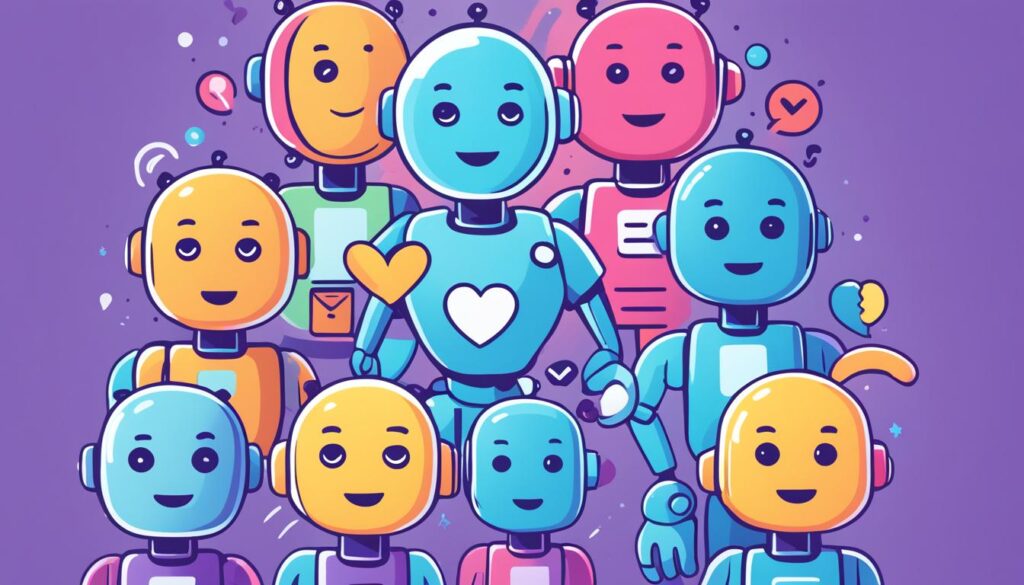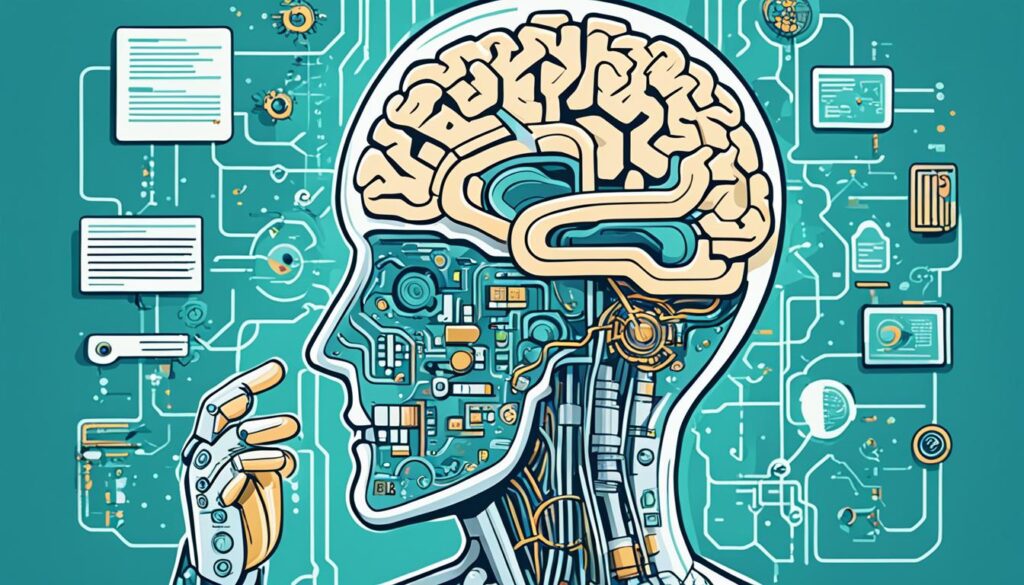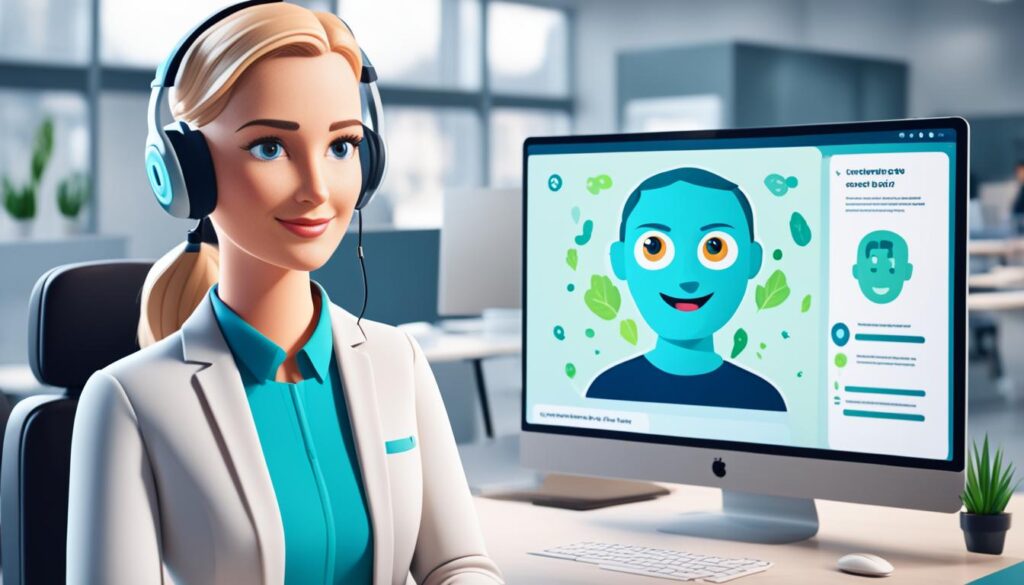Have you thought about how artificial intelligence could help with your mental health? AI is changing healthcare, especially in mental health. It offers personalized support that might know you better than a regular doctor. As we look for new ways to support our mental health, AI therapy is becoming more popular. It promises to make help more accessible and tailored to what each person needs.
Research shows big steps forward; AI can spot anxiety signs with over 90% accuracy and find depression in kids with a 92% success rate. This is much better than the 47.3% accuracy of traditional methods. AI helps make talking about mental health easier and less scary. It lets people share their feelings without fear of being judged, making mental health help more reachable.
The Growing Need for Mental Health Support
In recent years, more people are seeking help for their mental health. About 10% of people worldwide face mental health issues. Sadly, nearly 15% of teens are also affected. Suicide is now the fourth leading cause of death for people aged 15 to 29.
In the U.S., almost 30 million adults with mental health problems don’t get treatment. This is often because of stigma, cost, and limited access to professionals. These issues show a big need for new ways to help.
Current Mental Health Statistics
It’s clear we need to focus on mental health. In the U.S., about every fifth person has a mental health issue. These problems cause many people to miss work, costing the U.S. economy $47.6 billion a year.
AI for mental health care could be a big help. It offers more access and new ways to treat mental health issues.
Barriers to Accessing Traditional Therapy
Many people can’t get traditional therapy because of stigma and high costs. Sessions can be expensive, costing between $65 and $95. Also, finding mental health professionals can be hard.
AI mental health sessions often happen after work hours, affecting 64.8% of them. AI can help by making support more accessible. It can also create treatment plans that fit each person’s needs.
Understanding AI in Mental Health
AI technologies are changing how we treat mental health, tackling big challenges in the field. Mental health issues affect over 10% of people worldwide. AI aims to make diagnosis more accurate, predict patient outcomes, and make therapy easier.
How AI Technologies Are Changing Treatment
Machine learning and deep learning lead this change. They help doctors diagnose mental health issues with 63% to 92% accuracy. AI looks at big data to find patients at risk and start early interventions.
AI-powered wearables track mental health, like anxiety attacks, and alert contacts or professionals. This helps manage mental health better.
Natural language processing helps create mental health chatbots. These chatbots improve communication between patients and doctors. They offer quick support and advice, making mental health care easier to get. AI also looks at non-verbal signs through computer vision, giving a full picture of a patient’s mental state. This helps spot mental illness early and treat it right, leading to better results for patients.
Personalized Mental Health Support with AI
AI is changing mental health care fast. It uses machine learning to give support that fits each person’s needs. This makes treatment better and more effective.
The Role of Machine Learning and Deep Learning
Machine learning changes how we tackle mental health issues. It spots early signs of problems like depression and anxiety. This means help can come before things get worse.
AI looks at your health history and symptoms to make treatment plans just for you. This way, you get the right kind of help for your situation.
Creating Tailored Treatment Plans
AI keeps track of how you’re doing over time. It changes treatment plans as needed. This includes using chatbots like Woebot and Wysa for quick support.
These chatbots talk to you in a way that feels real, helping you find ways to cope. More people are getting the help they need, and they’re doing better because of it. This is making it easier for people to talk about mental health.
The Power of Mental Health Chatbots
Mental health chatbots have changed how we get support for our minds. With AI-powered therapy bots like Woebot, help is always available. These tools use cognitive behavioral techniques for deep conversations. They track your mood and offer personalized advice to help you feel better.
Examples of AI-Powered Therapy Bots
Woebot started in 2017 and now helps over a million people. In New Jersey, Virtua Health offers it for free. The team behind Woebot includes experts who keep making it better with new research and feedback. Other bots like Replika and Wysa also help people share their feelings safely.
Benefits of 24/7 Availability and Anonymity
Chatbots let you get help anytime, which is a big plus. They offer support without the usual therapy hours. You can talk anonymously, which helps reduce the stigma around mental health topics. This privacy makes it easier for people to get help when they need it, promoting openness.
With support tailored to you through machine learning, these chatbots are key to better mental health care worldwide.

Emotional Intelligence and AI
Emotional intelligence AI is key in making mental health apps better. It uses conversational AI to connect with users more deeply. By noticing things like how people talk and feel, AI can really get what someone is going through. This makes the support more supportive, making people feel heard and understood.
How Conversational AI Enhances User Experience
Conversational AI with emotional smarts is a big win for mental health. It picks up on what people say and do, making talks more personal. Thanks to smart learning, it gets better at showing empathy. This lets people share their feelings safely, creating a space for healing.
Evaluating Emotional States Through Technology
AI goes beyond just looking at feelings. It can spot signs of stress, worry, or sadness in how people act and speak. This lets it offer support that really fits what someone needs. Adding tech that recognizes emotions makes mental health chatbots more effective, helping people feel better.
AI Counseling: A Complement to Traditional Therapy
AI counseling has changed how we think about mental health care. It offers tools that help people deal with their feelings. But, the real magic often comes from talking to another person.
The Importance of Human Interaction in Mental Health
Adding AI to mental health support doesn’t mean we don’t need people. Feeling understood is key to solving tough emotional problems. AI helps match people with therapists who can really help, like those dealing with anxiety or relationship issues.
AI doesn’t take the place of human therapists. It helps make getting help easier and more accessible. By letting users choose what they prefer, like the therapist’s age or style, AI makes therapy fit better. But, at the end of the day, real understanding comes from talking to another human.
AI is great at spotting mental health issues and helping therapists understand them better. But, the bond between a therapist and client is something AI can’t replace. This bond is what leads to deeper healing and lasting well-being.

Challenges and Ethical Considerations in AI Usage
Using AI in mental health care brings up big challenges, especially about ethical issues. A big worry is about keeping data safe in AI. It’s important to make sure users’ data stays private. If not, it can hurt their mental health and trust in AI.
Data Privacy and Security Concerns
Keeping personal mental health info safe in AI is key. Groups need to have strong rules to keep data safe from hackers. There’s also a worry about biases in AI that could lead to wrong treatment advice. It’s hard to keep patient info safe while making sure treatment is right.
The Need for Transparency in AI Algorithms
It’s important for AI to be open about how it works. When people know how their data is used and how treatment choices are made, they trust AI more. Being clear about how algorithms work and watching for biases helps get people’s okay before using AI. This makes sure AI is fair and builds trust between users and AI.
Future Implications of AI in Mental Health Care
AI is changing how we think about mental health care. It’s breaking down barriers that have made it hard for people to get help. With new AI tools, more people can get the care they need, especially those who have been left out before.
Increasing Accessibility and Reducing Stigma
AI is making mental health care easier to reach. It looks at different kinds of data to spot health issues early. This means people can get help sooner, especially those who couldn’t get it before, like those in low-income areas or minority groups.
AI is also helping to reduce the stigma around mental health. People can talk about their feelings and health without fear of being judged. This makes it okay to seek help, making mental health care more accessible to everyone.
Conclusion
AI-powered mental health support is changing how we handle mental health care. Tools like Woebot use cognitive-behavioral therapy to help with anxiety and depression. Teletherapy platforms also make getting help easier, no matter where you are.
Studies show these new tools really help people feel better. They offer personalized help that meets each person’s needs. This shows AI can make a big difference in mental health care.
AI helps make mental health care more accessible and understands people’s feelings better. It looks at lots of data to make treatment plans better. With more people facing mental health issues, AI will play a key role in helping us.
AI is changing mental health care for the better. It makes support more personal and responsive. This shift is all about making mental health care better and more private. The future looks bright, with AI leading the way to better mental health solutions for everyone.
